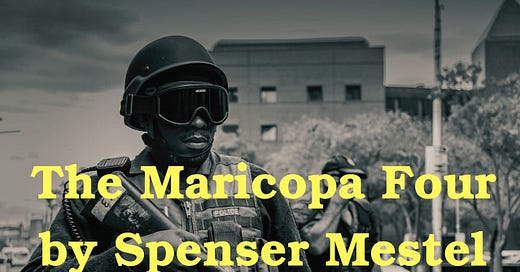One night in the summer of 2022, I was in Provincetown, tossing and turning in bed. The midterms were only a few months away, and what kept me awake was a question I think we’ve all wrestled with at some point: What would happen if the Maricopa County Elections office were held hostage?
During the 8 years I spent as a journalist covering voting rights, I learned about one worst-case scenario after another — but this specific tragedy always felt the realest to me. No one takes threats against election officials particularly seriously, and the weeks between Election Day and when counties finally certify the vote provide ample opportunities for armed vigilantes.
Since that night in Ptown, everything feels tenser, darker, more precarious. So still, I worry (probably just me, though! *laughs with anxiety*).
Because I’m no longer a reporter (just a humble consultant / media trainer!), I decided to explore these feelings in a new way.
My first short story, “The Maricopa Four” is here.
I know it sounds dark, but don’t worry, y’all. I kept it fun + cute + light. Think: Spenser’s Super Tuesday meets “White House Down.”
Enjoy the excerpt below, and here’s hoping that it all remains as fiction (*laughs again, sweating*).
“At first, when the four men burst through the double doors to the office, Amy thought they were there to fix the high-speed envelope opener. It had been broken for the past day and a half, and Amy missed its gentle whirring as she slogged through hours of absentee ballot signature verification.
“That was how she’d settle into a rhythm: zmmmmmm, zmmmmm as she checked the loops of the Ls and Os, zmmmmm, zmmmmm again for the Ps and Bs. The work wasn’t enjoyable, but it helped Amy tune out the rest of the office and all of the nonsense outside, on the other side of the parking lot. In the machine’s absence, she’d even started humming quietly to herself, zmmmmm, zmmmmmm. . .
“Distracted by a particularly flourishing Q, Amy didn’t look up until Charity gasped. That’s when she caught the tail end of what one of the men was saying.
“‘ — liars and traitors,” he announced, pausing for effect. Over the past four years, Amy had heard that phrase so often that she almost went back to the signatures. Just that morning, three days after Election Day, she’d heard it and much worse as she walked into work. But unlike the protestors lining the building, this man didn’t shout or point an accusatory finger or spit in Amy’s direction. He seemed timid, almost apologetic, avoiding eye contact with any of the dozen people in the office.
“‘And that is why we’re here today,’” he finished. His speech sounded robotic, like a groomsman who’s rehearsed a few too many times, and no one moved except for Charity, who looked around and raised her hands toward her chin as if she might start clapping.
“After three or four awkward seconds, the man inhaled, puffed up his chest, and gestured with two fingers at opposite corners of the large room. On that cue, the three other men dispersed. One locked the doors behind them, one shuttered the blinds on all the windows, and one walked toward Amy and stood beside the stack of ballots she was working through. The operation had the appearance of military precision, though Amy noticed each of the men periodically looking down at his hand, as if he’d written instructions to himself. . .”




